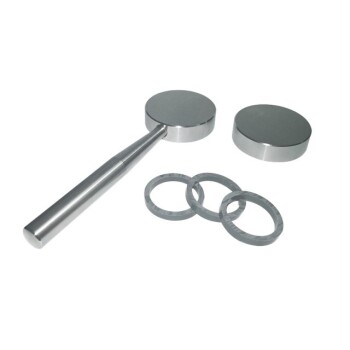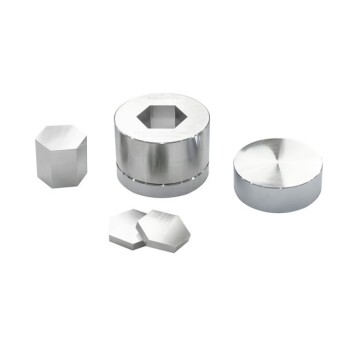At its core, a hydraulic pellet press is defined by its material versatility. These machines can compact a vast range of substances, including metals, ceramics, polymers, plastics, and various composite materials. They are particularly effective when processing these materials in a powdered or granular form to create dense, solid samples.
The true value of a hydraulic pellet press lies not in a simple list of compatible materials, but in its ability to apply precise, high compressive force. This core function is what allows it to transform loose powders from nearly any category into solid pellets for analysis, testing, or specialized manufacturing.

The Spectrum of Compatible Materials
A hydraulic press achieves its versatility by delivering controlled force, making it suitable for compacting substances with widely different properties. The applications span across scientific research, quality control, and advanced production.
Metallic and Ceramic Powders
Hydraulic presses are fundamental in metallurgy, geology, and material science. They are used to compact metallic and ceramic powders into solid pucks or pellets.
These pellets are often created for analytical techniques where a flat, dense, and homogeneous sample surface is required for accurate measurement.
Polymers, Plastics, and Composites
In the polymer and plastics industries, these presses are used to create test samples. By compacting materials like rubber, plastic, or advanced composites, technicians can analyze physical properties.
This helps assess material performance, check for manufacturing consistency, and test factors like blocking resistance in laminates.
Pharmaceutical and Environmental Samples
The pharmaceutical industry uses pellet presses to form tablets and prepare samples for analysis. The ability to create a uniformly dense pellet is critical for consistent results.
Similarly, in environmental science, soil or sediment samples are often pressed into pellets to prepare them for compositional analysis.
Advanced and Specialized Materials
These presses are indispensable in cutting-edge research and high-performance manufacturing. They play a key role in developing and producing materials like super alloys, battery components, and catalysts.
In these applications, precise control over the compaction process is crucial for achieving the desired material density and performance characteristics.
Why Hydraulic Presses Are So Versatile
The machine's broad applicability stems from a few key engineering principles. Understanding these principles helps clarify why it can handle everything from soft polymers to hard ceramics.
The Principle of Controlled Compressive Force
A hydraulic system allows for the generation and application of immense force (often up to 25 tons or more) in a controlled and uniform manner.
This high pressure reduces the voids between particles, forcing them into a dense, solid state. The ability to vary this pressure makes the press adaptable to both soft and hard materials.
Adaptability Through Tooling
Hydraulic pellet presses use interchangeable pressing tools or "dies." By simply swapping out the die set, users can create pellets of different diameters and thicknesses.
This modularity means the same machine can be used to prepare a small 15 mm sample for one test and a larger 40 mm sample for another.
Ideal for Powdered Forms
Most materials are processed in a powder or granular state. This form is ideal for compaction, as the fine particles can flow and rearrange under pressure to form a cohesive, solid mass.
Understanding the Trade-offs and Limitations
While versatile, a hydraulic pellet press is a specialized tool with a specific function. Understanding its limitations is key to using it effectively.
Focus on Compaction, Not General Forming
A hydraulic pellet press is designed for one primary task: compacting materials into a dense pellet or puck.
It should not be confused with large industrial hydraulic presses used for processes like stamping, drawing, or blanking, which involve shaping large metal sheets.
Material Properties Dictate Pressure Needs
Not all presses are created equal. Compacting a soft polymer powder requires significantly less force than compacting a hard ceramic like silicon carbide.
Ensure the press's maximum pressure rating is sufficient for the hardest material you intend to process.
Sample Preparation is Critical
The press is only one part of the equation. The quality of the final pellet heavily depends on the initial preparation of the material powder.
Factors like particle size, moisture content, and the use of binding agents can dramatically impact the integrity and density of the final sample.
Making the Right Choice for Your Application
Selecting the right approach depends entirely on your end goal. The versatility of the press allows it to serve several distinct functions.
- If your primary focus is material analysis (e.g., XRF): You need a press that delivers enough force to create a non-porous, perfectly flat surface for accurate readings.
- If your primary focus is R&D and property testing: Versatility in pressure control and a range of tooling sizes are critical for creating diverse test samples of polymers, composites, or new alloys.
- If your primary focus is specialized manufacturing (e.g., catalysts, battery parts): The key is precise, repeatable control over pressure and dwell time to ensure consistent product quality from batch to batch.
Ultimately, understanding that the press is a tool for controlled compaction empowers you to leverage its versatility for nearly any material you need to consolidate.
Summary Table:
| Material Category | Common Examples | Key Applications |
|---|---|---|
| Metallic and Ceramic Powders | Iron, copper, silicon carbide | XRF analysis, material science research |
| Polymers and Plastics | Rubber, composites, laminates | Physical property testing, quality control |
| Pharmaceuticals and Environmental Samples | Tablets, soil, sediments | Compositional analysis, consistency checks |
| Advanced Materials | Super alloys, battery components, catalysts | High-performance manufacturing, R&D |
Ready to enhance your lab's efficiency with precise compaction? KINTEK specializes in hydraulic pellet presses, including automatic, isostatic, and heated models, designed to deliver uniform force for metals, ceramics, polymers, and more. Whether you're in research, quality control, or specialized manufacturing, our machines ensure dense, reliable samples for accurate analysis. Contact us today to discuss your needs and discover how KINTEK can support your laboratory goals!
Visual Guide

Related Products
- Laboratory Hydraulic Press 2T Lab Pellet Press for KBR FTIR
- Automatic Laboratory Hydraulic Press Lab Pellet Press Machine
- Laboratory Hydraulic Press Lab Pellet Press Button Battery Press
- Manual Laboratory Hydraulic Press Lab Pellet Press
- Laboratory Hydraulic Press Lab Pellet Press Machine for Glove Box
People Also Ask
- How is a laboratory hydraulic press used for polymer melt crystallization? Achieve Flawless Sample Standardization
- How do hydraulic press machines ensure precision and consistency in pressure application? Achieve Reliable Force Control for Your Lab
- What role does a laboratory hydraulic press play in carbonate powder prep? Optimize Your Sample Analysis
- How is a laboratory hydraulic press used for Tb(III)-Organic Framework FT-IR samples? Expert Pellet Pressing Guide
- Why must a laboratory hydraulic press be used for pelletizing samples for FTIR? Achieve Precision in Spectral Data



















